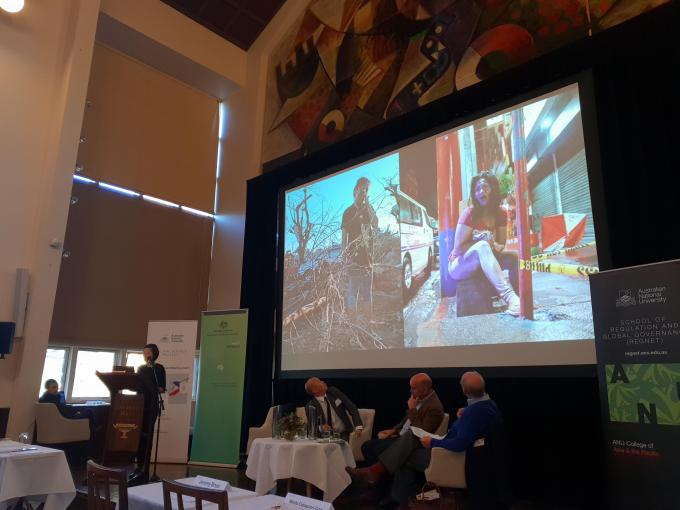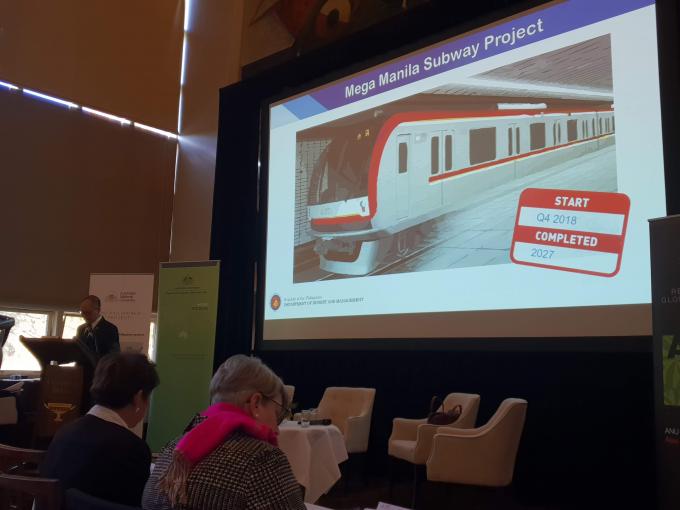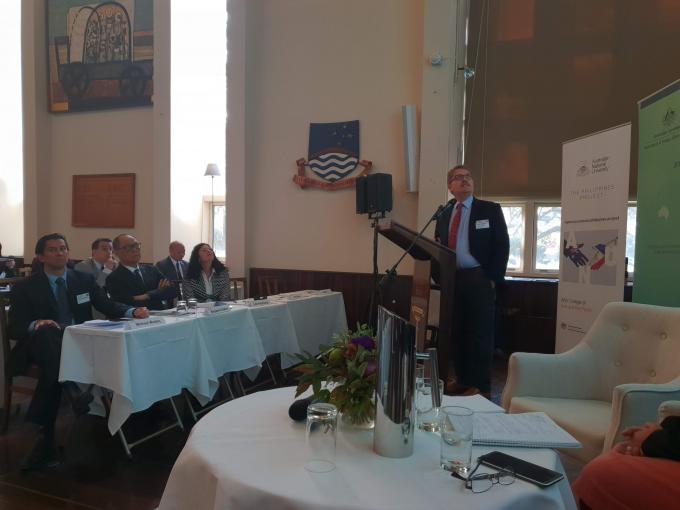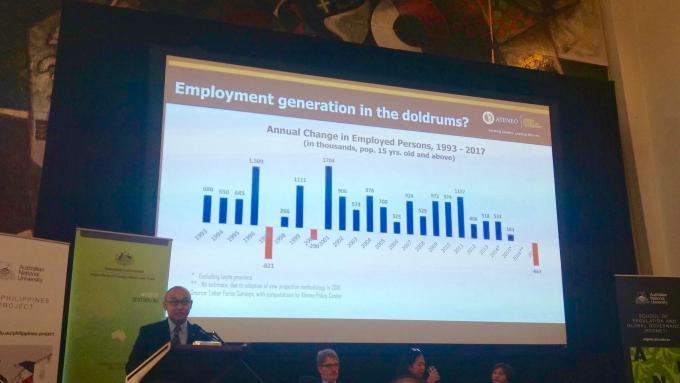ASoG Dean Ronald Mendoza presents a briefing on the political economy of Duterte reforms in Australian National University
31 May 2018
Last May 25-26, 2018, the Australia National University recently hosted the 2018 Philippines Update, a biennial conference of top scholars and experts on the Philippines that tries to generate an over-all assessment of the political, social and economic landscape, with a particular focus on key policy issues. The update promotes greater awareness between Australia and the Philippines on key policy issues of mutual interest.
The first Philippine Update was organised in 2012, with support from the Australia Department of Foreign Affairs and Trade. Secretary Ben Diokno of the Department of Budget and Management gave the keynote address in the 2018 update. He elaborated on the government’s build-build-build infrastructure program, as well as the ongoing institutional reforms pursued by the DBM.
Other speakers included Dr. Nicole Curato of University of Canberra, Dr. Manuel Solis of University of Adelaide, Dr. Steven Rood of Social Weather Stations and Dr. Paul Hutchcroft of Australia National University. In addition, Dean Ron Mendoza of the Ateneo School of Government provided a short briefing on the political economy of reforms under President Duterte. Some of the key findings from the Philippines Update 2018 include the following:
ON MARAWI

Researchers from Marawi note rising concern over Marawi residents’ lack of access to ground zero and nearby environs. There is rampant speculation on whether and to what extent Marawi residents will be allowed back to their homes/properties, fueled in part by reports of looting, and poorly communicated rebuilding plans. Now over a year after the siege, the military is said to still be engaged in clearing operations.
There are also issues raised against the military regarding looting. Military officials on the ground have since communicated that the issue has been dealt with, but no further information beyond this has been shared. Researchers shared that military officials were able to share more information and held regular press briefings during the siege; but now there is far less information being provided to media/the public.
Feedback from the military is that their collaboration with PNP-SAF has generally been positive and effective. Initial concerns over earlier attempts at collaboration were quickly dispelled; and the general assessment of PNP-SAF is a very positive one.
ON THE ECONOMIC LANDSCAPE

Presentations by various participants—later further confirmed by the presentation by Sec Benjamin Diokno—noted the country’s so far impressive macroeconomic conditions, despite some headwinds, notably on investment uncertainty (linked to TRAIN2 and to some extent the law and order situation) and the rising inflation, particularly food inflation.
There were concerns, however, raised on the lack of progress in implementing deep structural reforms that could promote a stronger middle class – including the need to advance a domestic manufacturing base that could employ millions of poor and low income Filipinos. Analysis by the Ateneo Policy Center was presented in order to emphasize how job creation has actually regressed according to government data, and that historically, job creation has not matched the credit boom and impressive growth years we have witnessed recently.
Several analysts alluded to the important links across job creation, an economically empowered middle class, and the breaking of traditional politics. As regards the latter, one analyst raised the issue that the middle class in the Philippines is largely disenfranchised—she referred to the OFWs who are based abroad and a large group of young people who have begun to aspire towards working abroad as well. The argument is that this situation does not necessarily strengthen the kind of change-politics that is necessary to end the political noise that continues to plague the country, and in large measure impacts on the economy due to policy incoherence and inconsistency.
ON THE PRESENT POLITICAL CLIMATE

Researchers acknowledged the generally noisy political climate in the Philippines, exacerbated in large part by President Duterte himself. Incidents and issues such as Boracay, Marawi, “ending ENDO”, “Operation Tokhang”, “Kuwait OFW rescues” appear to follow a pattern of rash decision-making with less transparent planning and execution of policy decisions. This risks producing growing disenchantment, and erosion of the popular support for the Duterte administration.
As regards the prospects of dramatic changes in policy, as well as prospects for future leadership after the Duterte administration, the 2019 election is seen as a bellweather. No one identified any unifying opposition figure or party yet, even as many acknowledged the need to develop/resuscitate the reform agenda on rebuilding damaged institutions like the judiciary and perhaps to some extent the Philippine National Police.
Furthermore, the rapprochement with China is acknowledged as necessary and useful particularly in terms of trade opportunities; but increasingly problematic given the opaque nature of the Chinese in terms of economic engagements/projects. At least several participants raised the concern that the country will need to monitor its debt situation, as well as any possible corruption issues, particularly given the historical pattern in some other countries that also dealt with China.
There is also rising concern over the apparent lack of action to advance the country’s interests in the West Philippines Sea. The recent successful landing of a Chinese bomber in Woody Island in the Paracels (which is not claimed by the Philippines but still disputed by China with other ASEAN economies like Vietnam) gives a strong and aggressive signal from the Chinese, and the Philippines has been quiet on this incident along with other developments in the disputed areas of the West Philippine Sea. There is growing public clamor to change direction on this.
Analysts were also unanimous in their concern over the weakening of institutions, particularly linked to the issues surrounding the government’s anti-drugs campaign which has resulted in thousands of dead Filipinos (the final number of which is still largely not known); and also the unseating of Chief Justice Maria Lourdes Sereno of the Supreme Court. Analysts also raised how the judiciary will need deep reforms to resuscitate the rule of law on many fronts.
In the words of Prof. Christina Bonoan and Dr. Bjorn Dressel: “The removal of a critical Vice President, for instance, would eliminate the possibility of an agenda-threatening leadership change should the President’s ill health deteriorate. Similarly, removing the Ombudsman and Election Commissioner tampers with horizontal accountability mechanisms to control hyper-presidentialism—the excessive presidential powers that stem from weak party politics that characterise the Philippines. Above all, the removal of Sereno clears the path for greater control of the Supreme Court, which has the power to derail Duterte’s political plans for constitutional change as well as serve as a check to controversial policies, such as his violent war on drugs. Understanding impeachment and judicial politics in the Philippines can tell us much about the future of Asia’s oldest democracy. One thing already seems clear: liberal constitutional practice is more fragile than expected. Its outcome is sure to be watched closely by neighboring leaders who may be only too eager to embrace and encourage populist illiberalism.”[1]
[1] http://www.newmandala.org/dismantling-liberal-constitution-one-instituti...
